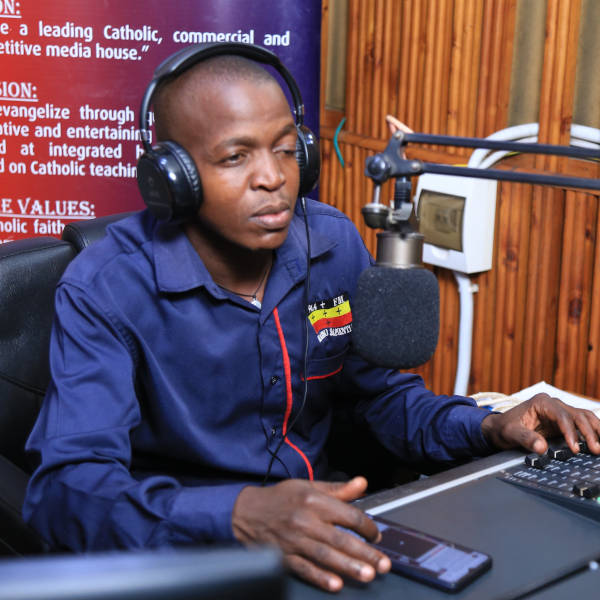
 Mama FM
Mama FM

 Mama FM
Mama FM
10 November 2025, 12:26 pm
By Byamukama Alozious
The illegal charcoal trade continues to fuel widespread deforestation across Uganda, threatening forests, livelihoods, and the country’s climate future despite repeated government bans and enforcement efforts.
When Charles Katabalwa, a journalist with Radio Sapientia in Kampala, noticed his crops withering under a scorching sun in Kasanje, the environmental crisis suddenly felt personal. “I’m not just a journalist; I’m also a small-scale farmer,” he said. “I had planted beans and maize to feed my family, but the heat destroyed everything before harvest.” That painful experience inspired him to investigate why Uganda’s weather patterns were changing and what drives the continued destruction of the country’s forests.
Katabalwa’s investigation exposed how corruption and weak enforcement allow the illegal charcoal trade to flourish. A trader he met, who transports charcoal from Soroti to Kampala, explained how easy it is to operate despite restrictions. “I just give the LC1 chairman one hundred thousand shillings,” the trader said. “He writes me a letter, and I bribe the officers along the road. Once I reach Kampala, I sell freely.” When contacted, the LC1 chairperson admitted issuing such letters, saying people rely on the trade for survival. “Even if I refuse, they’ll get another letter somewhere else,” he said.

Further inquiries revealed that even legal permits from the National Environment Management Authority (NEMA) often involve bribes. Traders pay what they call “facilitation” fees to secure documents allowing truckloads of charcoal to reach Kampala markets. This cycle of corruption, Katabalwa says, has turned environmental destruction into a system sustained by greed and desperation.
According to the National Forestry Authority, Uganda now has only about 10 percent of its land under forest cover around 1.9 million hectares—down from more than twice that figure two decades ago. Between 2000 and 2020, the country lost over 23 percent of its total tree cover. At the same time, over 90 percent of Ugandan households still rely on firewood or charcoal for cooking, with urban centers like Kampala depending almost entirely on charcoal. In 2022 alone, Uganda produced about 1.2 million tonnes of charcoal, according to UN data.
Katabalwa credits the Uganda Media Women’s Association (UMWA) for sharpening his investigative reporting skills through a public accountability training supported by Vikes. “Through UMWA’s mentorship, I learned that stories like these are not just about trees being cut,” he said. “They are about governance, corruption, and poverty that together destroy our forests.” Catherine Apalat, the project officer at UMWA, said Katabalwa is among several journalists across the country trained under the one-year public accountability reporting program. “Our aim was to build journalists’ capacity to expose governance gaps and promote environmental accountability,” she said.
The impact of deforestation is already visible. Flash floods have recently submerged homes and businesses in Kampala, while landslides in Bududa and Kasese have claimed lives. In many rural districts, soil erosion and prolonged droughts have reduced harvests, deepening food insecurity. “If we continue cutting trees at this rate, we will see more floods, more landslides, and more deaths,” Katabalwa warned in one of his radio broadcasts. “The government should invest in massive sensitisation and reforestation programs.”
Some local initiatives are encouraging each household to plant at least ten trees, but such efforts remain too small compared to the scale of forest loss. As Uganda prepares to begin oil production in 2026, Katabalwa believes the government should also prioritise access to affordable cooking gas to reduce dependence on charcoal. “If gas becomes cheaper and accessible, Ugandans will have an alternative, and our forests might finally get a chance to breathe again,” he said.
He further urged the National Forestry Authority to introduce a strict traceability system to ensure that every charcoal trader has a verified certificate showing where the charcoal was obtained. Without such accountability, he warns, illegal trade will continue to thrive and undo efforts to restore the environment.
For Katabalwa, environmental journalism has become more than just a profession. “The environment is our shared responsibility,” he said. “As long as trees continue to fall silently in our villages and corruption fuels the trade, Uganda’s climate crisis will keep worsening. Each bag of charcoal entering Kampala may light a home, but it also darkens the future of our forests, our farms, and our children.”